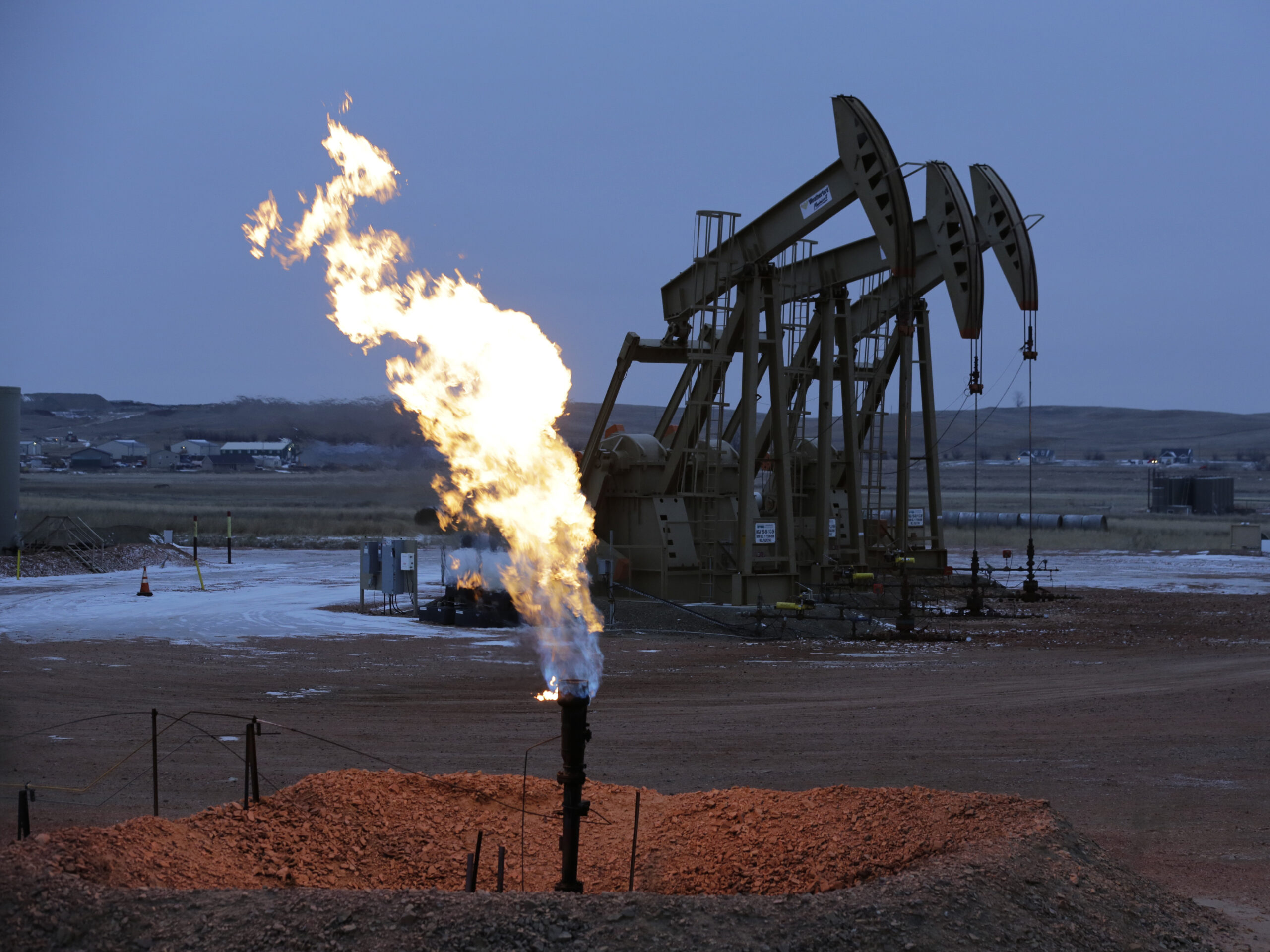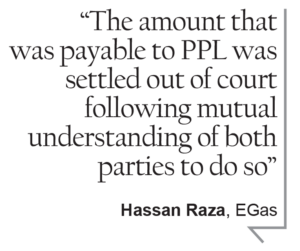Normally, Pakistan’s Oil and Gas Regulatory Authority (OGRA) renewing a company’s licence is not a particularly notable event. But it seems the licence renewal of EGas Private Ltd is becoming a bit of a bone of contention.
Founded in 2010, EGas is a virtual pipeline company. Their business model is to collect, transport, and sell natural gas that would otherwise be wasted in the process of oil extraction. Since its inception, the company has been operating in the Kabir and Dhok Sultan gas fields, leased by the government to energy exploration and production company Pakistan Petroleum Limited (PPL), and are on the verge of having their licence (which expired after the Covid-19 pandemic) renewed.
But the opposition to this licence renewal was recently brought up in a public hearing of OGRA, where a claim was put forward that Petroleum Division was unduly favouring EGas, pointing towards a history of payment defaults and working unlicensed based on unauthentic letter on the part of EGas that should, according to these critics, make renewing EGas’ licence a problem.
EGas denies these claims, attributing financial discrepancies to the unprecedented disruptions caused by the COVID-19 pandemic. Despite these challenges, EGas says it remains committed to fulfilling its financial obligations and resuming normal operations. The ongoing application for a new licence is seen as a crucial step towards stabilising the company’s operations and continuing its contributions to Pakistan’s energy sector.
What does EGas do?
EGas was established in 2010 to address the issue of flaring natural gas at various oil fields. When oil is extracted from oilfields, natural gas is also released in the process. Oil companies are there to get their hands on, process, and transport oil. Ideally, they would also be able to collect and transport the gas, but this often proves to be cost ineffective.
The infrastructure needed to transport the gas — pipelines — is either too distant or the volume and pressure of the gas are insufficient to justify the expense of a pipeline.
So what happens to the natural gas that is released? Well, if you’ve seen images from an oilfield of massive oil rigs and drills, you might have noticed there are massive chimney like structures in the background that periodically release huge flashes of fire.

The process of gas flaring is horrible for the environment, with a recent NPR report suggesting it actually releases five times the methane emissions originally calculated. It is also a waste of a scarce natural resource, especially in a country like Pakistan where there is a shortage of natural gas. Historically, companies extracting oil from wells, such as the Oil and Gas Development Company Limited (OGDCL) and Pakistan Petroleum Limited, have resorted to flaring due to logistical challenges associated with setting up a pipeline to transport such gas.
That is where EGas comes in. Recognizing the environmental and economic inefficiencies of this practice, EGas approached OGDCL in 2010, offering a solution: EGAS proposed purchasing the gas that was being flared, thereby reducing waste and emissions, and helping overcome gas shortages in the country. It is the Plains Bison approach: For the most efficient use of resources, you can’t discard anything and must find a use for it. EGas had found a similar model implemented in Italy.
Pakistan has been grappling with a severe gas shortage for several years, which has had significant implications for both domestic and industrial consumers. The shortfall in natural gas supply has led to frequent load shedding, forcing households to turn to alternative and often more expensive sources of energy for cooking and heating. The industrial sector, particularly the textile industry which is a major contributor to Pakistan’s economy, has also been heavily impacted. Many factories have had to reduce their operating hours or shut down entirely due to the lack of reliable gas supply, leading to loss of productivity and economic output.
For example, in the winter of 2022-2023, Pakistan experienced one of its worst gas crises in recent history. The government was unable to secure sufficient liquefied natural gas (LNG) cargoes, which are crucial for meeting the country’s energy demands during the colder months. As a result, domestic consumers faced prolonged gas outages, and industries reported significant production losses. This recurring problem has underscored the urgent need for innovative solutions to bridge the supply-demand gap.
To implement its solution, EGas imported specialised trucks and created a business model around transporting the gas which would otherwise be wasted through flaring. They developed trucks equipped to clean, dehydrate, and compress the gas, making it suitable for transport. These specialised trucks then delivered the gas to EGas-owned CNG stations and private buyers like Kohinoor Textile Mills. The success of this model attracted other oil and gas companies, including Mari Petroleum, to partner with EGas. This innovative approach not only maximises resource utilisation, but also contributes to environmental sustainability by significantly reducing flaring.

Over time, EGas has worked on six to seven fields using this approach, all under a licence from OGRA. However, these fields, being relatively small, have a finite lifespan and eventually deplete. Before COVID hit, EGas signed up two more fields, Kabir Oil Field in Sangar and Dhok Sultan Oil Field, both operated by energy producer Pakistan Petroleum Limited for which they were going to buy the gas from these oil fields under a licence. But a mix of unfortunate happenings including the Covid-19 disaster which upended production and a fallout with its partner PPL led to EGas’ old licence becoming obsolete. Now, they have been asked to get a new licence which will most likely be granted to them but it is going to come with some unhappy faces.
The nature of the allegations
EGas is currently facing allegations that it is being unfairly favoured by OGRA, the regulatory authority, which is poised to grant the company a new licence. How is it being favoured? Because it has allegedly been a payment defaulter of PPL in the past and has operated without a licence in its arrangement with PPL to purchase gas from Kabir Oil Field. These allegations were levelled in a public hearing by OGRA, which conducts these hearings to ensure that no one’s rights are infringed during the licence awarding process.
OGRA conducted this hearing regarding EGas’ licence on June 24 during which grievances were aired that EGas had previously operated without a licence and had also been a payment defaulter of PPL, defaulting on Rs 33 crores owed to Pakistan Petroleum. EGas says it never defaulted on any payment and rather technicalities in contracts that were four years old were being misrepresented by a competitor, Ghiyas Paracha, the chairman of All Pakistan CNG Association and founder and CEO of Universal Gas Distribution Company, to damage EGas’ reputation and eventually stall the licence awarding process. EGas also says that the permission to work without the licence was granted in the interim by OGRA on the request of PPL, while its licence request was being processed. The said licence was eventually presented to PPL.
How had the events unfolded? Matters date back to 2020 when EGas first received its licence to purchase gas from PPL from Kabir Oil Field. Before the COVID-19 pandemic, EGas had successfully obtained a licence from OGRA for the Kabir Oil Field. But before it could completely secure a licence, it was allowed to transact with PPL and purchase gas while its licence was being processed. As per Hassan Raza, a director at EGas, PPL had directly requested OGRA to allow sale of gas to EGas even though EGas’ licence was being processed and was not issued yet. PPL weighed that while the licence was being processed, gas was going to be wasted if EGas could not buy it because its licence was not there yet, which would have led to a revenue loss for PPL.
That request went to OGRA from PPL and in response, OGRA issued two letters pertaining to each field, allowing PPL to start selling gas to EGas from Kabir Oil Field as well as Dhok Sultan Oil Field. Documents from that time available with Profit show that one of the letters turned out to be unauthentic. Allegedly, the person whose signature was on the documents said that he had signed one but not the other. It was the document pertaining to PPL starting to sell to EGas at Kabir Oil Field which turned out to be unauthentic, received by PPL in the mid of March 2020.
EGas’ response
EGas says that they were allowed to transact with PPL for both fields on an interim basis as per OGRA’s permission, and if a document in that regard turned out to be unauthentic, it wasn’t done by EGas and was a matter between OGRA and PPL. EGas says that when it got the licence, it presented that to PPL. Documents available with Profit show that EGas received the licence to purchase gas from Kabir Oil Field in May 2021.
Soon after, the pandemic led to a shutdown of everything including the fields. The Covid-19 disruption came with contractual problems compounded by the “take or pay” agreements in place, which obligated EGas to pay for the gas regardless of whether it could be sold in the market or not because of the lockdowns.
In face of the situation where lockdowns meant EGas could not sell gas, EGas invoked the force majeure clause in its contracts, a legal provision that frees both parties from liability or obligation when an extraordinary event or circumstance beyond their control prevents one or both parties from fulfilling their obligations. This move was essential for EGas, as it legally suspended their payment obligations due to the unforeseeable and uncontrollable global crisis. But EGas owed a big amount to PPL for the time it was working with, leading to a creation of Rs 33 crores in receivables from EGas to PPL. PPL even took EGas to court to recover this amount and asked the court to even liquidate the company for recovery of what it owed to PPL. The receivables that were stuck formed the basis of complaints during the OGRA hearing that EGas had defaulted on this amount, when in fact EGas settled this amount through bank guarantee and cash payments in April of 2024.
EGas emphasises that the financial receivables created during the lockdown were a direct result of these unprecedented conditions and were not due to any financial mismanagement or default on their part.
When the lockdowns were lifted, and operations began to resume, PPL requested EGas to obtain a new licence to continue purchasing gas and settle the amounts that it owed to PPL. Documents available with Profit show that EGas settled the amount via cash payments and bank guarantee in May 2024.
“The amount that was payable to PPL was settled out of court following mutual understanding of both parties to do so,” says Hassan Raza, who runs EGas.
EGas has reiterated its commitment to fulfilling its financial obligations and has taken steps to secure the necessary guarantees and payments as directed by the Ministry of Petroleum. The company maintains that its efforts to clear outstanding dues through direct payments and bank guarantees demonstrate its reliability and commitment to resuming normal operations. The current application for a new licence is part of this effort to normalise operations and contribute to the energy sector, not an attempt to receive undue favour from OGRA.
The settlement was carried out pursuant to permission of the Petroleum Division granted in January this year to Pakistan Petroleum Limited to reallocate gas from Kabir gas field to EGas, allowing it a quota of 1mmcfd.
The approval is contingent on several conditions which includes PPL ensuring that the sale and purchase transaction with EGas is free from any legal encumbrances and that all necessary due diligence is conducted to ensure the commercial prudence of the transaction. Furthermore, EGas must obtain a licence for the sale of gas from OGRA, and the existing Gas Sale and Purchase Agreement (GSPA) between PPL and EGas must be amended to reflect the revised terms and conditions. Lastly, PPL must seek approval from its Board on these conditions before proceeding further, considering the legacy issues and PPL’s commercial stake in the transaction.
Separately, EGas Private Limited had applied for a new licence to sell flared gas from Kabir Oil Field which they are expected to get now.
Interestingly, during the hearing, a concern that was raised was that Rafhan Maize Products Co. Ltd, which EGas said was its gas customer, was not a customer of EGas. Hassan Raza agrees that Rafhan Maize is not a customer because there can’t be an agreement with Rafhan Maize until there is a licence. So technically they are not a customer yet. However, they do have a Letter of Intent (LoI) signed with Rafhan Maize Products to commence sale and purchase of gas once EGas receives its licence from OGRA.
Further, MOL Pakistan, an oil Exploration & Production (E&P) firm operating in Pakistan since 1999, also raised concerns over granting a licence to EGas, stating that EGas was their defaulter and had not cleared its dues. Hassan Raza said that the matter with MOL Pakistan was subjudice and OGRA officials during the hearing also told representatives from MOL Pakistan that if the matter was in the court, the public hearing was not the right forum to discuss it.









